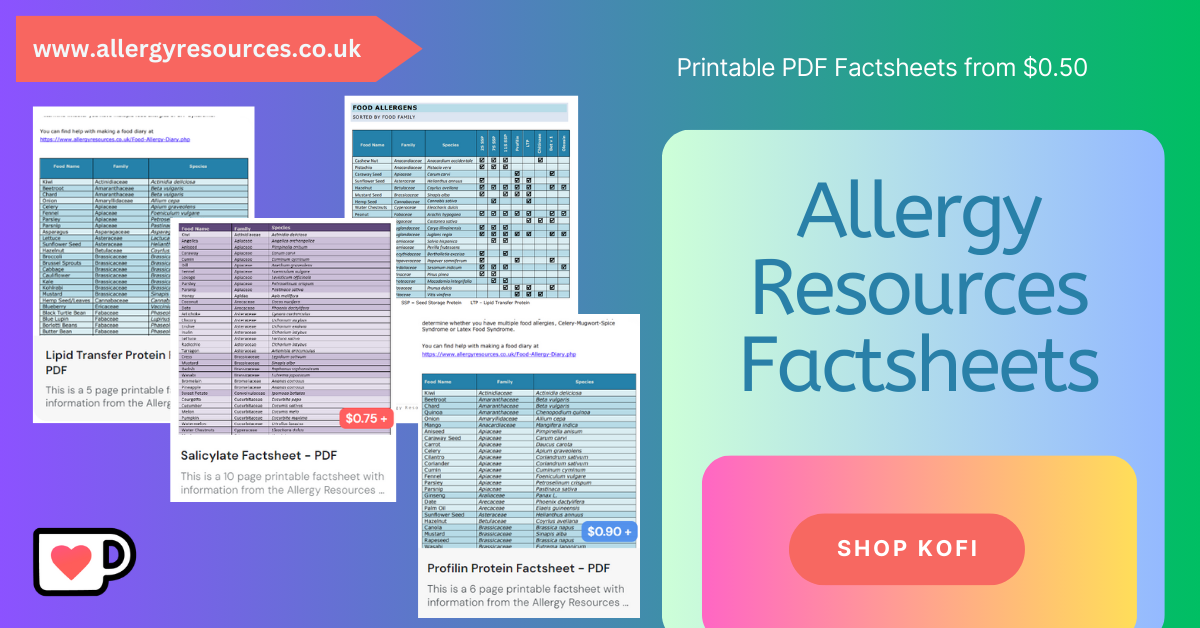
CUCUMBER ALLERGY
Key Allergens
Cucumbers are in the Cucurbitaceae family of plants which also includes pumpkins and melons.
None of the allergens in cucumber have been recognised by the World Health Organization (WHO), but it is thought that the allergen responsible for causing allergic reactions are profilin proteins. There needs to be more studies showing allergenicity before it can be added to the WHO Allergen Database.
Profilin proteins are panallergens, they have the potential to cause allergies over several groups of plants.
When preserved in vinegar cucumbers become pickled and are referred to as pickles (or gherkins in the UK), the pickling process most likely reduces the allergenicity of profilin proteins in the cucumber as these proteins are easily damaged.
None of the allergens in cucumber have been recognised by the World Health Organization (WHO), but it is thought that the allergen responsible for causing allergic reactions are profilin proteins. There needs to be more studies showing allergenicity before it can be added to the WHO Allergen Database.
Profilin proteins are panallergens, they have the potential to cause allergies over several groups of plants.
When preserved in vinegar cucumbers become pickled and are referred to as pickles (or gherkins in the UK), the pickling process most likely reduces the allergenicity of profilin proteins in the cucumber as these proteins are easily damaged.
Food Intolerances




When pickled, cucumbers are high in sulphites. Fresh cucumbers are low in sulphites. Sulphites are inorganic salts used in preservations and have the potential to cause symptoms of food intolerance to those sensitive to sulphites, this food intolerance is more common in asthmatics. An improvement in symptoms can be made with a change to a low sulphite diet.
Cucumber is a low FODMAP food. FODMAP stands for Fermentable oligosaccharides, disaccharides, monosaccharides and polyols. Foods high in FODMAPs can cause symptoms of food intolerance, affecting the gastro intestinal system and this can be mistaken for a true IgE food allergy.
Cucumber is a food high in salicylates. Salicylates have the potential to cause worsening of asthma, swelling, itching and hives as well as food intolerance symptoms in people who are sensitive to salicylates.
Cucumber is one of the few vegetables to contain a moderate amount of lectins, another cause of food intolerance. Cooking foods with lectins makes them more digestible and can reduce the symptoms of food intolerance.
You can read more about Food Intolerances on the dedicated Food Intolerance Page.
Associated Syndromes
Allergy to cucumber can be linked to Celery-Mugwort-Spice Syndrome as the sensitising allergen is a profilin protein called Art v 4, these proteins are also sometimes also called Bet v 2 proteins. This is a subtype of Pollen Food Allergy Syndrome. Where sensitisation to a pollen causes allergy to food containing similarly shaped foods.
There is also a link between cucumber and Latex Food Syndrome. The plant involved in latex allergy Hevea brasiliensis, the rubber tree plant, has an allergen called Hev b 8 which is a profilin protein. Those very sensitised to latex may have a contact allergic reaction from other foods or plants containing profilin proteins, there is less evidence of this than sensitisation to other latex linked proteins like hevein and chitinases.
There is also a link between cucumber and Latex Food Syndrome. The plant involved in latex allergy Hevea brasiliensis, the rubber tree plant, has an allergen called Hev b 8 which is a profilin protein. Those very sensitised to latex may have a contact allergic reaction from other foods or plants containing profilin proteins, there is less evidence of this than sensitisation to other latex linked proteins like hevein and chitinases.
Cross Reactivity
Those with a sensitivity to latex may have linked allergies to foods which contain high levels of chitinase, like avocado, chestnuts, corn (maize), kiwi, papaya, pomegranate and tomatoes.
Other plants containing profilin proteins are dates, kiwi, pineapple, celery, peanut, chilli, watermelon, orange, hazelnut, muskmelon, carrot, strawberry, soya beans, barley, walnut, lychee, lupin, apple, banana, cherry, almond, peach, pear, mustard, tomato, aubergine and wheat.
Other plants containing profilin proteins are dates, kiwi, pineapple, celery, peanut, chilli, watermelon, orange, hazelnut, muskmelon, carrot, strawberry, soya beans, barley, walnut, lychee, lupin, apple, banana, cherry, almond, peach, pear, mustard, tomato, aubergine and wheat.
Resources
Websites
Allergen Encyclopedia - Cucumber
Anaphylaxis Campaign - Allergy to Vegetables
ATP Science - Salicylate Food List
Articles and Journals
Phytochemical and Biological Studies of Cucurbitaceae: A Mini- Review, 2024
Two new allergens in a watermelon (Citrullus lanatus) allergy episode, 2022
Prevalence of tomato and cucumber sensitization among greenhouse workers, 2021
Dietary Lectins: Gastrointestinal and Immune Effects, 2020
Pollen-food allergy syndrome in children, 2020
Cucumber Anaphylaxis in a Latex-Sensitized Patient, 2011
Cucumber Allergy (CA) and Latex IgE Sensitization, 2010
Cross-allergenicity among celery, cucumber, carrot, and watermelon, 1993
Let me know if you found any of these interesting or useful.
If you spot an article or research that you think is interesting you can message me or tag me on Facebook or Twitter - links at the bottom of the page.